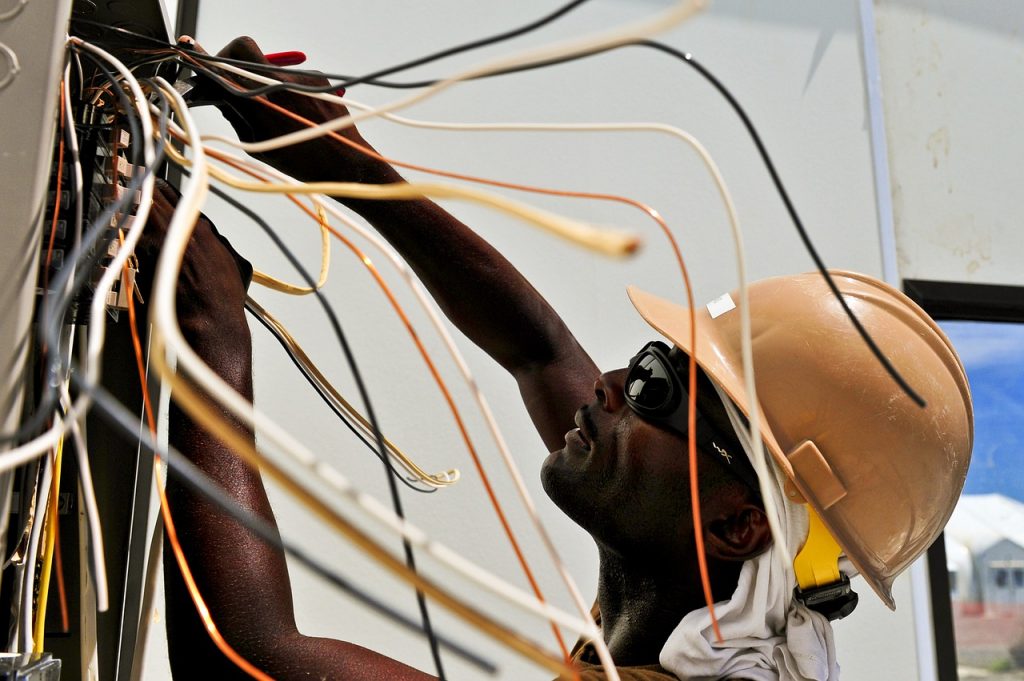Those who are interested in a challenging and productive career, which is also fulfilling and rewarding, may find the career of an electrician a good fit.
In the article below, we will explore the job of the electrician, including skills and qualifications, training, working hours, responsibilities, and more.
Electricians deal with the installations, maintenance, testing, and repair of various electrical components from lighting to power distribution.
They may work in different settings such as a family home or wiring an entire factory.
Article Table of Contents
What Does an Electrician Do
Since the world depends on electricity, electricians are in demand in almost every type of construction and industry.
They can have their own business and work independently, cooperate with other independent electricians.
They can also be employed by a large service firm or company and work under supervision.
The duties of an electrician may vary depending on their specialty.
For instance, residential electricians work on the systems inside people’s homes.
It usually includes replacing the wiring or fixing broken fixtures.
Industrial electricians deal with huge electrical systems in businesses such as factories, installing and wiring power grids, maintaining machinery, and more.
Responsibilities
- Understanding the project’s requirements by reading the orders and blueprints.
- Travel to different locations to complete tasks, sometimes including long distances.
- Understand the building regulations, industry standards, and policies according to the National Electrical Code to prevent electrical hazards.
- Install, maintain, and test electrical systems such as control panels or lighting systems.
- Inspect electrical parts and systems to ensure the correct functioning and efficiency without a hazard to the users.
- Diagnose electrical systems using various devices to look for potential problems and be able to explain them to clients or industry professionals.
- Replace or fix fixtures, equipment, wiring, and other components using hand and power tools.
- Supervise and train apprentices or other workers to install, maintain, repair, test, or replace wiring and other systems or equipment.
Essential Skills
Critical thinking:
Electricians should use logic to determine what is causing the problem.
For example, they check the wiring with multimeters and find the best way to fix it.
Color vision:
Many electrical parts, such as wires, use color-coding, so it’s essential for the electricians to distinguish between various shades.
Stamina:
To perform the tasks, electricians may need to stand for a long time.
While running wires or installing fixtures, they may find themselves in uncomfortable positions such as crouching, kneeling, or working in tight spaces.
Physical strength:
Electricians need to be strong enough to carry and move heavy components.
Customer-service skills:
Electricians deal with multiple people such as customers, fellow employees, or managers.
Therefore, they need to be able to listen to people’s needs and address them.
Business skills:
This is essential for the electricians who run their businesses.
They should solicit and bid for jobs, plan and carry out projects, track hours and inventory, delegate tasks, and manage budgets and bills.
How to Become an Electrician
With the complexity and potential hazards of the job, electricians need specific training to learn the necessary skills.
Generally, they learn through an apprenticeship, but they can also attend a technical school.
They may also need continuing education to keep up with the advancements in technology and changes in the codes and safety regulations.
Read the full guide:
How to Become an Electrician: The Definitive Guide
Training and Qualifications
To start off as an electrician trainee, one needs to be at least 18 years old and have a high school diploma or equivalent.
They will also have to pass a drug test and have one year of algebra.
Electricians usually learn their skills in an apprenticeship which can last for four or five years.
The programs are typically sponsored by contractor organizations or unions.
During every year of learning, they earn at least 144 hours of technical knowledge.
This includes theoretical knowledge such as math, electrical code, and theory, safety and blueprint reading.
They can also take some specialized training such as communications, soldering, or fire safety systems.
Apprentices should learn hands-on skills and gain 2,000 hours of on-the-job training.
They are getting paid during the apprenticeship.
After successfully completing the apprenticeship, electricians enter the workforce as journey workers.
They can perform their duties without the supervision of an experienced electrician as long as they follow the regulations and local practices.
They can also obtain training through technical schools, which may count as a credit against the apprenticeship program.
Some contractors also offer such programs.
Prospective electricians should obtain a license in most states by passing a test related to the regulations by the National Electrical Code.
You can find the necessary requirements on the National Electrical Contractors Association site.
Experience
After completing an apprenticeship, electricians will already have thousands of hours of work experience.
Those who take classes at technical schools will only receive credits for an apprenticeship where the on-the-job experience is needed.
So, without any on-the-job experience, it’s impossible to become an electrician.
Working Hours
Electricians typically work full-time, sometimes in the evenings, on holidays, or weekends.
When there’s a specific schedule of the project, such as during construction or planned maintenance, some overtime hours may be involved to complete the tasks.
Electricians working outdoors may need to adjust their schedule according to the weather.
The indoor electricians can stick to their schedule.
About 10% of all electricians work independently, and they can set their own working hours.
Career Outlook
The annual salary of electricians is $52,720, which is higher than other construction workers make ($42,310) and more than the workers in other industries make ($37,040).
The lowest salary of electricians can be at $31,800, while the highest can sum up to $90.420 per year.
According to the US Bureau of Labor Statistics, this career has excellent prospects, with 14% projected employment growth.
Other construction trades expect to see a 10% increase, while other occupations, only 7%.
The demand for electricians comes from a growing population needing places to work and live, and this requires wiring.
The employment rate will also improve thanks to the alternative energy sources as well as more efficient systems.
Electricians experienced in different types of systems or who have experience in the military service, have the best employment prospects.
Conclusion
After completing the right apprenticeship training, electricians can start a career and choose the type of work they want to do.
There are excellent employment opportunities for electricians as well as high demand and decent salary.
Both are above average nationwide.

